Dentures, or removable prosthetics, are a popular treatment choice for patients of all ages who seek basic dental function and acceptable cosmetic value. The economics or affordability issue involving denture treatments, however, can often cause tissue problems that are not anticipated by today’s younger patients.
For young adults, since we are all living longer compared to 30 years ago, a critical period can arise in older adult years were hard and soft tissue loss reaches catastrophic levels.
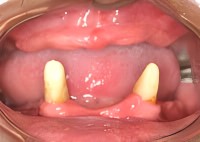
No Teeth Upper – Two Teeth Lower
Ordinary denture products rest on the gum tissues that are supported by underlying jawbone or the “bony ridge.” Without the stimulation of teeth or implants, the bone tissue will slowly resorb or disappear that causes a similar effect of disappearing gums.
Representative Case History Example
The adjacent pictures show the cumulative effects of about 25 years of denture use (upper jaw) and denture partials (lower jaw).
The 2nd picture shows the extreme loss of the bony ridge and gums. The anchor points for the partials provided a crude level of stimulation that maintained a small amount of bone health…. which is good.
There are cavern-like gaps of lost bone between the remaining teeth and rear-most areas of the mandible, or lower jaw.
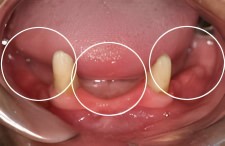
and Width
Comprehensive Bone and Tissue Augmentation
Extensive bone grafting procedures consisting of patient donated (autogenous) bone blocks harvested from different areas of the jaw and chin provided a superb foundation for regenerating new bone and gum tissue that competes nicely with what Mother Nature once provided.
To fortify the upper jaw for multiple implants, bone block grafts and sinus lift procedures placed bone graft material along the floor of the sinus cavity on an as needed basis that would provide an optimal depth of bone.
Assessing for minor differences in upper jaw bone dept is critical for assuring no breaches (perforations) of the sinus cavity floor occur…. a common issue for all upper jaw implant surgeries.
The porosity differences are substantially different for the upper and lower jaws. The mandible, or lower jaw, is quite dense.
The increased porosity of the upper jaw, which is Mother Nature’s method of providing a shock absorber requires close review to assure a consistent quality of bone from one end of the arch to the other.
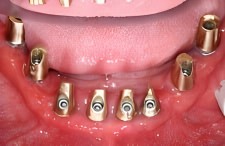
Results Level Continuous Bony Ridge
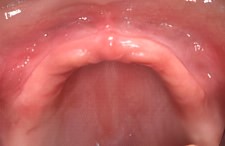
Long Term Denture Wearer
Bone Augmentation: Depth – Width – Porosity
The adjacent photos reflect the amount of augmentation that was created along the entire upper jaw ridge of bone.
Depth, width and especially the porosity of the bone has been modified to assure a rock solid foundation for the fixed bridge prosthetics desired by the patient.
Note how leveling and filling in of low spots develops an idealized implant environment that will provide the best advantages for thorough osseointegration.
Temporary prosthetics were provided during the grafting surgery stages to assure the patient he would not be toothless during any phase of the treatment plan.
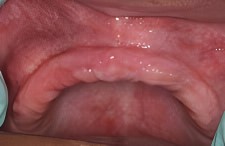
Implant Site Preparation
4 – 6 – 8 Implants
The adjacent photo reflects healthy integration of eight (8) dental implants. The concept of having an entire arch of teeth replaced on a foundation of 4 implants is becoming popular.
While four implants for a fixed bridge are considered the bare minimum it is important for patients to understand that more implants preserve more bone and distribute biting forces more efficiently that can eliminate the problem of implant failure due to a “too strong” of a bite.
To summarize… 4 implants are better than none, 6 are better with 8 or more being the best.
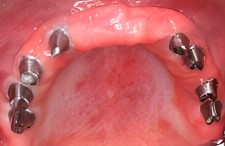
Upper Jaw
Premium Reconstruction: 8 + 8 + Titanium and Porcelain Fixed Bridgework
Going from 2 natural teeth to a full complement of 24 new “integrated” porcelain teeth produces an increase in dental function and cosmetic result that defies description.
A discriminating patient who “went without” for so many years while he focused on raising a family, finally took the opportunity to rebuild and replace what was lost long ago.
The dental products, technologies and procedures selected by the patient represent what many dentists would call the best of the best. He simply wanted the treatments that would deliver not only “exactly” what he wanted…. but with the best possible long term endurance that is possible with today’s dentistry.
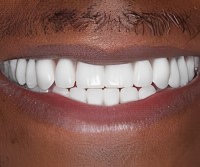
How Do Dental Implants Support Jaw Bone Health?
Tooth loss can have a significant and detrimental impact on your appearance. It can also affect the way your jaw moves when you speak and chew. Finally, untreated tooth loss is associated with the accelerated breakdown of the jaw bone. This deterioration starts just weeks after a tooth is lost. It happens because the stimulation that was passed from the tooth, through its roots, to the jawbone has ceased. In order for the jawbone to continue to regenerate, it relies on the vibrations that come through natural teeth roots. The gradual loss of bone tissue isn't dangerous to your overall health, but it can eventually lead to a sunken appearance around your mouth. Because we can prevent this from happening, we prefer to do just that, and dental implants afford us that opportunity!
Dental implants are known for bringing lifelike stability to artificial teeth. The tiny titanium posts achieve this because, once your dentist inserts them, they gradually become encased in bone. This happens because your body grows more bone around the implant posts during the three to six months after they've been placed. The stimulation that is started with the insertion of your dental implants continues every time you chew, just like would normally occur with natural teeth. With this stimulation, your jaw bone density is expected to remain consistent throughout your life.
Is Bone Grafting for Dental Implants a Long Procedure?
Bone grafting treatment is sometimes necessary to ensure the success of dental implants. There are several ways in which this can be done. We usually perform bone grafting using bone harvested from another area of the mouth or body. The process may sound complex, but, in the hands of an experienced implant dentist, bone grafting may take only a few minutes. If only a small amount of grafting is necessary, the procedure may take less than half an hour. For more complex cases in which bone grafting is needed for multiple areas, the procedure may take about 90 minutes. Well before your bone grafting procedure, you'll be informed regarding all aspects of your case. You will know what to expect throughout the process, including how long we expect your appointment to last, and also how we'll work to ensure you are comfortable throughout your visit.
Is Bone Grafting for Dental Implants Painful?
Your comfort is important to us. Bone grafting is performed using an appropriate anesthetic, delivered via brief injections directly into the gums around the area of focus. If you've had a dental filling or root canal, you know what these injections feel like and how powerful the medication is when it comes to numbing the mouth. In addition to this standard of care, your dentist can administer sedation to enhance your treatment experience. Sedation like nitrous oxide or oral medication can augment the effects of your local anesthetic while also creating an overall sense of calm as you receive care from our highly-trained team.
It is normal to experience soreness or tenderness after the bone grafting procedure. We'll discuss how you can manage this temporary side effect with prescription painkillers or over-the-counter medication and a soft-food diet.
What are the Advantages of Implant-Supported Bridgework?
We enjoy performing dental implant treatment for our patients because we are aware of the numerous benefits that they can gain from this technique. Whether you need to replace a few teeth or require full-arch restoration, our team can achieve outstanding results in terms of appearance as well as long-term function. One of the primary advantages of dental implant-supported bridgework is that your new teeth will both look and feel like your natural teeth. The stability that is provided by the implant posts enables you to speak and chew normally. You won't need to alter your eating habits, nor will you need to change much about your daily oral care.
Call 414-464-9021 for information on any of our services.
Check out our Dental Blog >>
Read our Patient Case Studies >>
Hampton Dental Associates is proud to offer affordable dentistry programs to help you regain your perfect smile.
Learn more about our affordable dentistry options.



